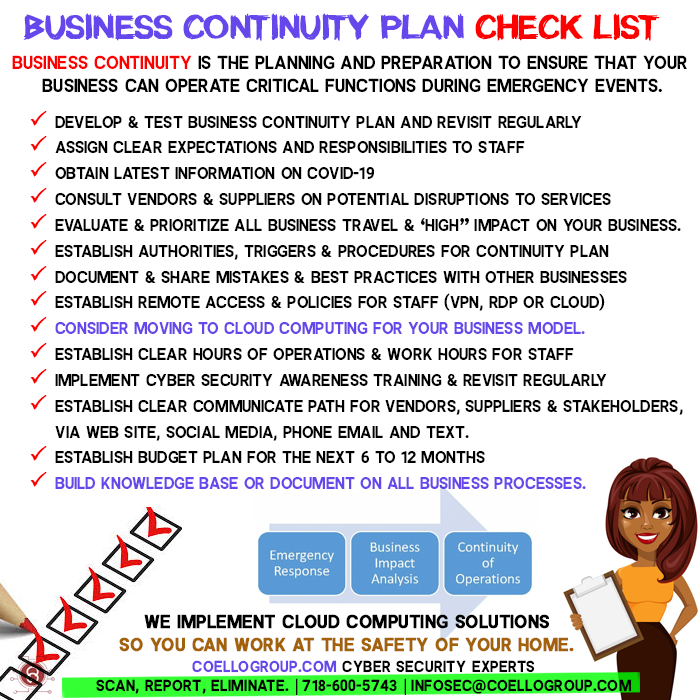Business continuity is the planning and preparation to ensure that your business can operate critical functions during emergency events.
Planning Activities
- Develop a business continuity plan and Revisit regularly
- Assign clear expectations and responsibilities to staff
- Obtain latest information on COVID-19
- Consult vendors, suppliers and stakeholders on potential disruptions to services like internet, phone, supplies, resources or merchandize.
- Review prioritize all business travel
- Evaluate and prioritize all ‘high level” impact on your business
- Make sure entire company is aware of the roles during a crisis
- Test the plan in simulation
- Document and Share mistakes and best practice with other businesses
- Establish remote access and policies for staff via VPN, RDP…
- consider moving to cloud computing for your business model (backups, storage, 0365, Google Docs, AWS, SharePoint, Salesforce, Azure or Google Cloud.)
- Establish clear hours of operations and work hours for staff
- Implement cyber security awareness training and Revisit regularly
- establish clear communicate path for vendors, suppliers and stakeholders, via web site, social media, phone email and text.
- Establish budget plan for the next 6 to 12 months
- Take inventory of all resources, vendors, consultants, projects and processes.
- Build knowledge base or document on all company business processes.
- List contact information for all key personnel
- Identify important business data on all devices and back it up
Risk management
- Identify activities, employees and inputs required for business to stay afloat
- project impact of employee absences, disruption to the supplies from local and overseas vendors
- Identify where sensitive information is stored/processed
- Identify means to back up sensitive information and prioritize this information on recovery
- Examine impact of COVID-19 on your market and customers
- Identify and agree business priorities and deliverables
- evaluate business need for face-to-face meetings and consider moving cloud computing business model.
- Establish authorities, triggers and procedures for implementing plan.
- Consider the issues for business related travel and financial management implications due to COVID-19
- Assess the magnitude that others will be dependent on your business due to COVID19, services or products.
- evaluate the circumstances under which you might decide to scale up, scale back or suspend operations due to COVID-19
- Establish budget plan for the next 6 to 12 months
Measures to Reinforce Continuity
- Nominate deputies
- List contact information for all key personnel
- Cross-train, and identify alternative resources
- Communicate in a manner suitable to current state of COVID-19 as per national guidelines
- Prepare clear emergency communications plan, web site, social media, text, phone or print.
- Prepare policies on sick leave, extended benefits, insurance and compassionate leave due to COVID-19
- Prepare travel policies for local and staff overseas
- Assure that supplies, products or services are available
- set clear expectations with clients and vendors on products and services.
- Consider the options of changing your product or services to adjust with current market
Responding to Workplace Risks
- Consider moving to cloud computing for your business model (recommended)
- Prepare policies on hygienic behavior for employees and visitors to premises.
- Plan to provide for hand washing, hand hygiene, mask, gloves, disposable suites, tissue disposal and other facilities as per national guidelines
- Plan for frequent and effective cleaning of the workplace as per national guidelines
- Prepare policies as per national guidelines to advise those who are infected, or are suspected to be infected with COVID-19
- Plan measures to reduce face-to-face contact with customers, vendors and employees
- Identify measures that can reduce infection between staff
- Prepare policies on flexible work locations, telecommute and flexible working shifts
- Provide infrastructure to support teleworking and remote customer interaction.

Business Continuity Plan checklist
